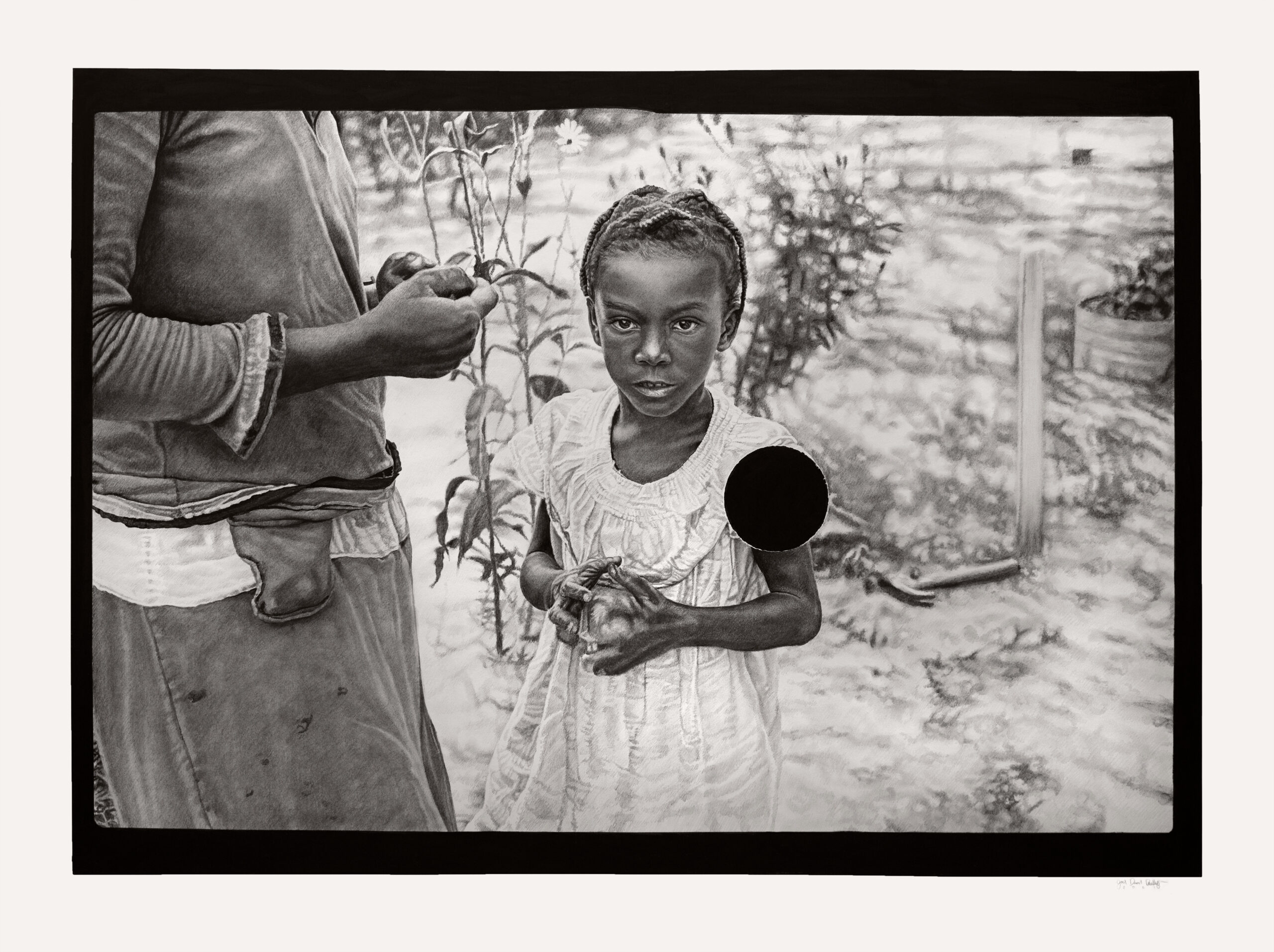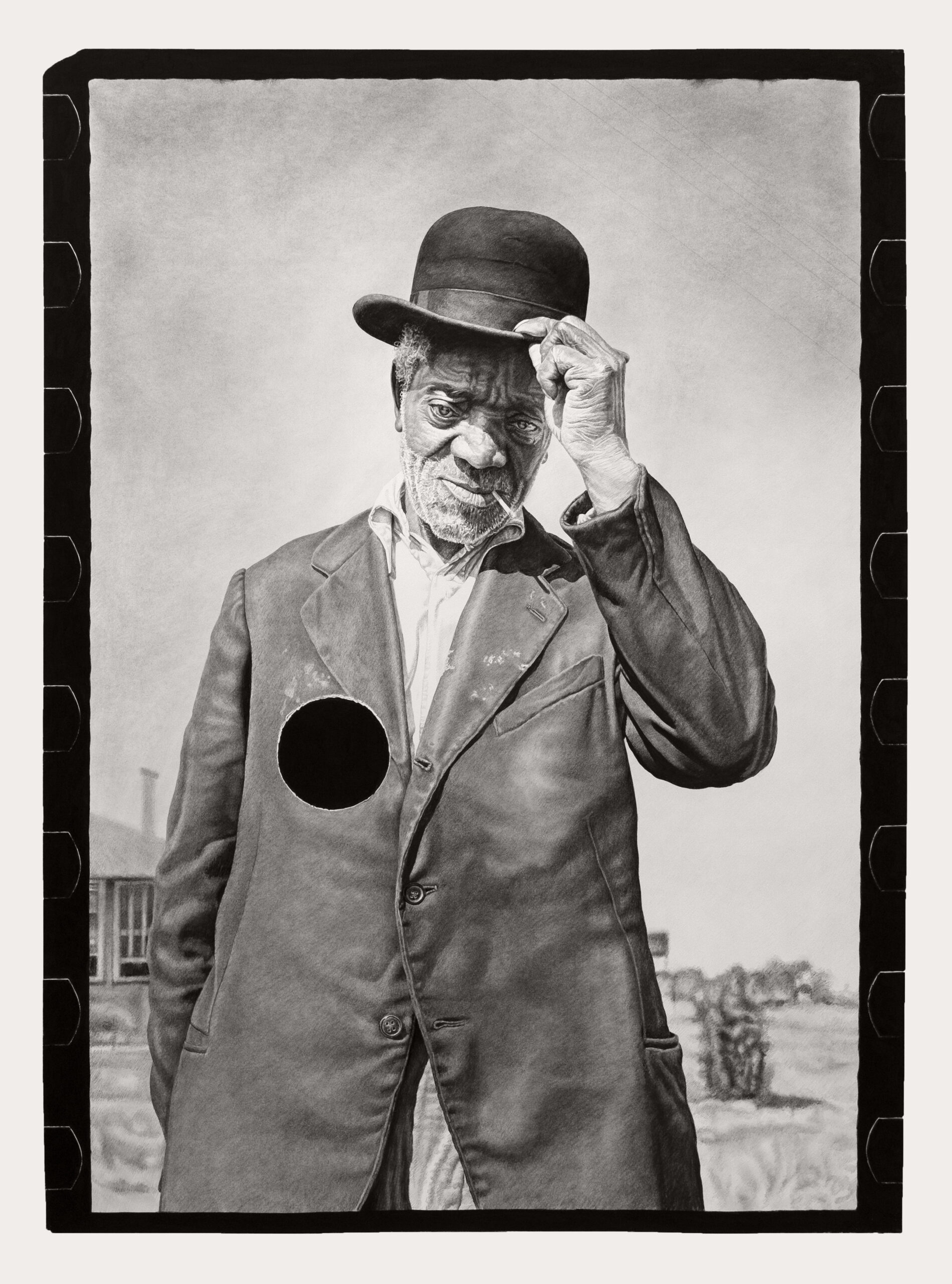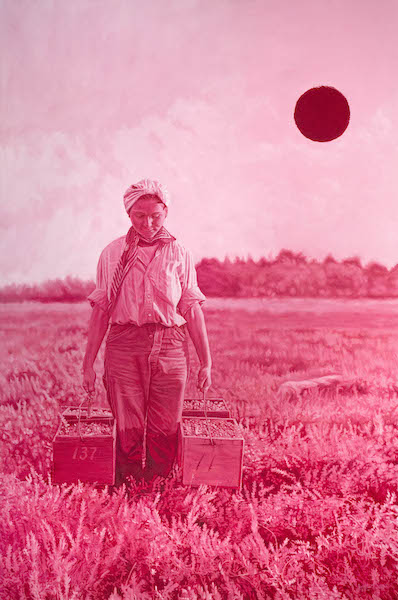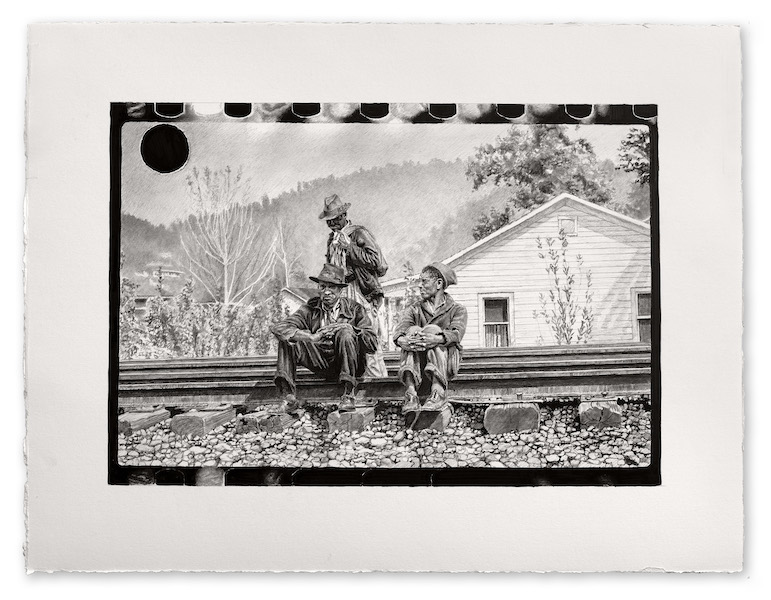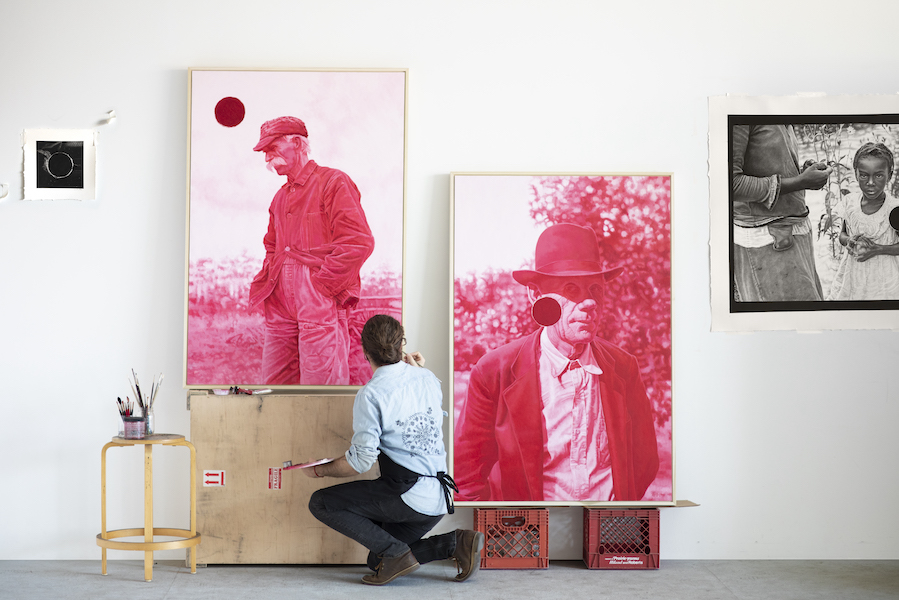Killing the Negative: Poetic Interventions
While looking through materials on Works Progress Administration (WPA) projects, visual artist Joel Daniel Phillips stumbled upon an image—a 1936 photograph by Walker Evans with a gaping black hole in the center. This chance discovery of a “killed negative” led Phillips and poet Quraysh Ali Lansana into a collaborative project, Killing the Negative: Poetic Interventions, that explores complex intersections of representation, truth, and power—crucial concepts that are at the center of our contemporary society.
With the stated goal of “introducing America to Americans,” the Farm Security Administration (FSA) commissioned photographers to travel across the United States and document the hardships of the Great Depression between 1935-43. Images like Dust Storm, Cimarron County, Oklahoma (1936) by Arthur Rothstein or Migrant Mother, Nipomo, California (1936) by Dorothea Lange have come to represent the Great Depression in American memory. Roy E. Stryker, who headed the information division of the FSA, screened hundreds of thousands of negatives submitted by the photographers. He wielded his editorial power through an irreversible act—by punching holes in 35mm negatives. Once punched, the images could not be used—whether in popular magazines or in Congressional presentations about the plight of Americans. This destructive editing process was called “killing the negative.”
In this compelling collaborative exhibition, Phillips, Lansana, and a group of noted American poets including recent US Poet Laureate Joy Harjo, North Carolina Poet Laureate Jaki Shelton Green, Ken Hada, Randall Horton, Rose McLarney, Moheb Soliman, and Candace G. Wiley explore this deeper history, along with complex and timely issues of representation and agency.
Phillips transforms the historic images into large-scale, immersive graphite drawings (meticulously reproduced as giclee prints for exhibition purposes), which urge viewers to confront not just the realism of the image, but also the personal and cultural implications of stories embedded within the image. The poets respond to the image with interventions of text, sound, and breath to give voice to the subject. In each collaboration, poet and artist together fill the vacant space left by government censorship and create an entirely new conversation about power, representation, and the shaping of America’s historical narratives.
In 1938, FSA photographer Arthur Rothstein traveled to Eighty Acres, a segregated community at the edge of Glassboro, New Jersey. He met and photographed an older Black man identified only as an “Agricultural laborer,” and in one of Rothstein’s photographs, the man reaches up as if to tip his bowler hat. Back in his Washington office, Stryker inexplicably chose to censor this image, “killing” it with a sharp, black punch straight through the man’s chest. This image inspired the collaborative pairing of “hospitality” by Lansana and Killed Negative #13 / After Arthur Rothstein (2020) by Phillips. The richly toned large drawing fills a wall—the man looks down at and confronts the viewer with both the gentle tip of the hat and the gaping, violent, hole. Lansana’s words–and in the exhibition, his voice–ring out:
what rain must come
for a black man to wet? what sound makes us fall? . . .
you offer no food for my grandsons
mouths. no shelter from raging wind . . .
harvest a dream buried in dust
good day, sir
FSA photographers crossed the country to document need in America and build political and popular support for progressive social programs. While the photographs contributed to social reforms, the FSA initiative itself was not entirely open and equitable, and need in our communities is still present. Through these interventions, the poets and Phillips are exploring complex and timely issues that provide catalysts for important conversations about censorship, racism, agency, and equity.
This touring exhibition is an adaptation of the forthcoming exhibit organized by the Philbrook Museum of Art in Tulsa, Oklahoma.
Tour Schedule
Killing the Negative: Poetic Interventions is touring September 2026 through August 2031. The dates below reflect seven-week exhibition periods. Dates are subject to change; please contact MoreArt@maaa.org or (800) 473-3872 x208/209 for current availability.
-
September 1, 2026–January 7, 2027
Irving Archives and Museum
Irving, TX booked -
January 28, 2027–March 16, 2027
Texas A&M University
College Station, TX booked -
April 6, 2027–May 25, 2027
available -
June 16–August 11, 2027
available -
September 1, 2027–October 20, 2027
Charlotte Museum of History
Charlotte, NC pending -
November 10, 2027–January 7, 2028
available -
January 28, 2028–March 16, 2028
Palo Alto Art Center
Palo Alto, CA booked -
April 6, 2028–May 25, 2028
Cherokee Strip Regional Heritage Center
Enid, OK booked -
June 16, 2028–August 11, 2028
Coffeyville Convention and Visitors Bureau
Coffeyville, KS pending -
September 1, 2028–October 20, 2028
available -
November 10, 2028–January 7, 2029
Refurbishment at Mid-America Arts Alliance
Kansas City, MO booked -
January 28, 2029–March 16, 2029
available -
April 6, 2029–May 25, 2029
available -
June 16, 2029–August 11, 2029
available -
September 1, 2029–October 20, 2029
available -
November 10, 2029–January 7, 2030
available -
January 28, 2030–March 16, 2030
available -
April 6, 2030–May 25, 2030
available -
June 16, 2030–August 11, 2030
available -
September 1, 2030–October 20, 2030
available -
November 10, 2030–January 7, 2031
available -
January 28, 2031–March 16, 2031
available -
April 6, 2031–May 25, 2031
available -
June 16, 2031–August 11, 2031
available
Exhibition Details
22 drawings (in reproduction form) paired with 19 poems (text on panels, with audio/headphones and QR codes for video access)
-
Content
Fee Includes:
Press Kit
Registrar’s Packet
Programming Guide
Gallery Guide
Text Panels
Narrative Labels
Full Insurance
Installation Instructions
Custom-Designed and Built Crates -
Curated By
Susan Green, Associate Curator of Special Collections, Archives and Research at the Philbrook Museum of Art
-
Organized By
ExhibitsUSA, Mid-America Arts Alliance, Kansas City, MO
-
Out-of-Region Rental Fee
$9750
-
In-Region Rental Fee
$5850
-
Duration
7-week display
-
Shipping
Van Line
-
Running Feet
150-200 (Estimated; exact linear feet TBD)
-
Square Feet
-
-
Security
Standard (new term, akin to ModB)
-
Number of Crates/Total Weight
TBD
-
Insurance
The exhibition is fully insured by ExhibitsUSA at no additional expense to you, both while installed and during transit.
Downloads & Resources
Click HERE to view and download the Factsheet for Killing the Negative: Poetic Interventions.
